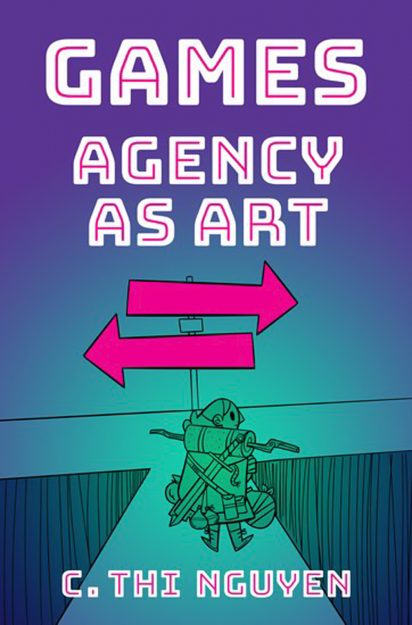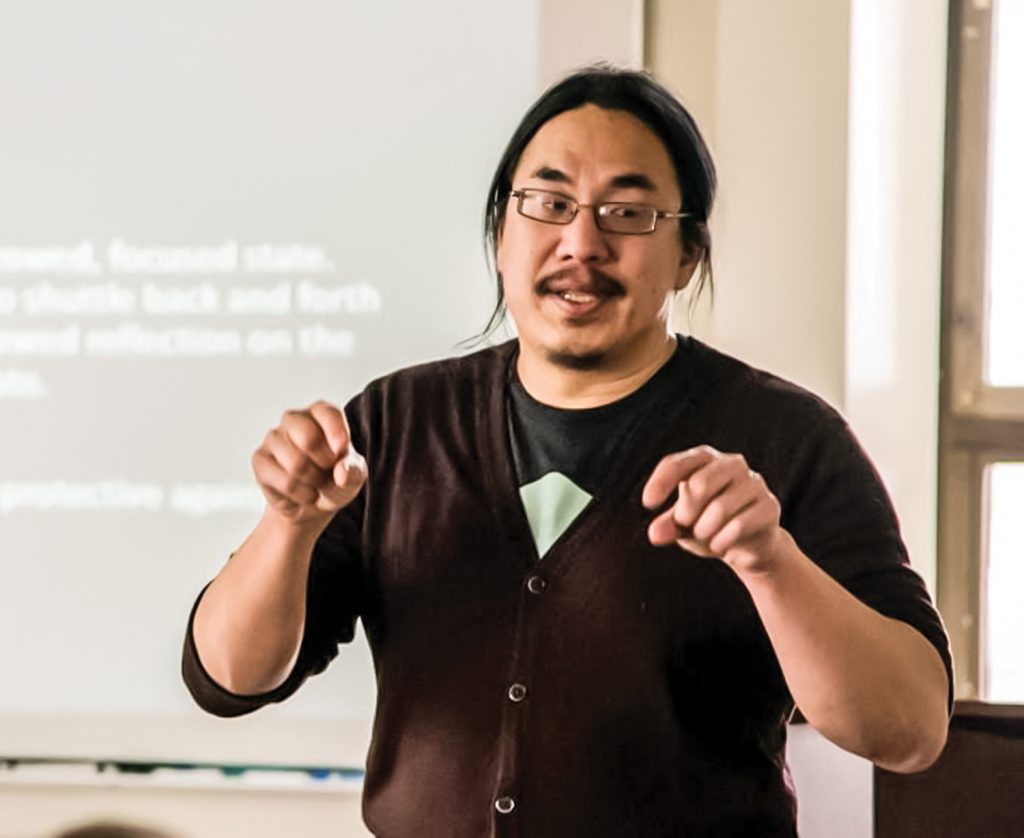Imagine this: You’re at a party when someone rolls out a multicolored plastic mat and asks everyone to take off their shoes. “Hey, I’ve got an idea,” they say. “Let’s forget about all this conversation, the party, the food. I’m going to start calling out random colors and limbs, which will dictate where you put those parts of your body in increasingly impossible-to-sustain poses. Sound good?” Out of context, the natural response might be to ask, “Why would anyone want to do this?” But, of course, we know that millions of people do exactly this in the game Twister. This raises the question: Why do we play games at all?
By C. Thi Nguyen
Oxford University Press, April 2020, 256 pp., $40.95, hardcover
In philosopher C. Thi Nguyen’s APA Award–winning book Games: Agency as Art, the University of Utah professor attempts to answer this question with a dissection of what actually constitutes a game in the first place. It’s a famously tricky problem, one that prompted Ludwig Wittgenstein to conclude there is “probably no single characteristic which is common to all the things we call games.” Nguyen begs to differ, framing playing a game as a “voluntary attempt to overcome unnecessary obstacles” for the sake of making possible the experience of struggling against them.
It’s a fascinating argument, one that holds up to most examples we throw at it. For example, a basketball player takes on the obstacles of not carrying the ball and defending one’s own hoop in order to enjoy the experience of passing a ball through the hoop. If the game were simply Pass A Ball Through A Hoop, we could get a stepladder and do it as many times as we’d like. That would be almost unimaginably boring. And yet struggling against basketball’s actual rules adds up to a deeply engaging experience that allows us to bump against the limits of human experience.
But this still seems to be raising the question of why we engage with games at all. Certainly, most of us have more pressing demands: hunger, sickness, death. Family, friends, spouses. Nearly everything seems to be more important than deciding how to put a specific body part on a spot or getting a ball through a hoop. To this, Nguyen offers the concept of “disinterested interestedness,” which he describes as “practical reasoning and practical action engaged in, not for the outcome, but for the sake of the engagement in the practical activity itself.”
The player can enjoy a game only if they give themselves over to its goals and rules entirely.
In other words, the player can enjoy a game only if they give themselves over to its goals and rules entirely, taking seriously the idea that passing a ball through a hoop in a particular way has some real significance. This requires a significant buy-in on our part, which in turn means momentarily forgetting our other everyday concerns in order to have an aesthetic appreciation of the struggle against basketball’s rules. In that situation, food is not so important.
But stealing the ball and going for a layup? That’s life or death.
Many Buddhist thinkers discuss the art of living in similar terms. A particular situation arises—a sense of frustration at work, an unexpected medical setback—and we must take the present moment on its own terms, choosing the most skillful response while remaining unattached to some imagined sense of how the world ought to be. What’s artful about this approach to life is how it flows without judgment with the present condition.
Of course, one might raise the objection that while games give players clear-cut goals and rules, life itself is often far more messy. In this sense, the game framework applied to our day-to-day choices might seem to minimize the art of living into a series of binary choices and point-keeping. Minus one point for a bad response to a coworker’s small talk. Plus three points for holding the door for a stranger.
But taken in the broader sense of Nguyen’s definition of games—the act of putting aside our long-term concerns and taking on the conditions in front of us in order to fully experience a particular moment—it seems there is a useful comparison to make. The moments of our lives are not similar to games in a trivial sense but rather in how they provide us with the conditions we must take on fully in order to experience their deeper meaning.
What this really comes down to is playfulness, or what Nguyen might refer to as an ability to take on different agential modes. In our daily life we can see this in our capacity to move smoothly and willingly between different mental and social states without creating an internal tension that says “This is how it should be.” We work in an office, we ride the bus, we enter a meditation room, we come home to a family. Each of those settings demands a different skillful response. Can we move into them playfully, taking on their demands fully and reacting in an appropriate way with an unencumbered mind? Can we play the game of the moment, see what is expected of us, and thus experience all that life has to give?
It recalls Soto Zen priest Dainin Katagiri’s discussion of time in Each Moment Is the Universe:
. . . accept the fact that whatever you do, wherever you live, under all circumstances, you have a chance to realize the truth. With sincerity, try to realize the ultimate nature of your actions: bowing, studying, talking, or whatever it is that you do. When you bow in gassho, just do gassho through and through. If you really do this, you can touch the ultimate truth.
In a related essay titled “Games and the Art of Agency,” Nguyen calls games “yoga for your agency,” in the sense that they increase our flexibility toward different states of being. In a video game, we jump in and out of, say, what it would be like to be a robot flying around an alien planet or a race car or a medieval thief. “In this way,” he writes, “we can find our way to greater flexibility with our agency, by temporarily submitting ourselves to strictures on that agency.” Isn’t this mindfulness? Not straining against the conditions of our life, but bending with them into a new and broader awareness?
Could we do this with all of our experiences? Can we take our lives seriously enough to play each of their moments?

Thank you for subscribing to Tricycle! As a nonprofit, we depend on readers like you to keep Buddhist teachings and practices widely available.
